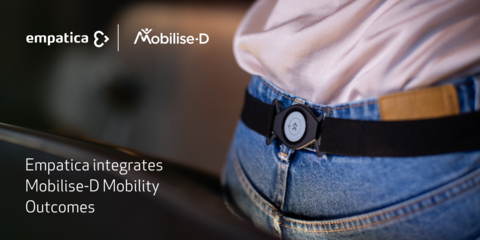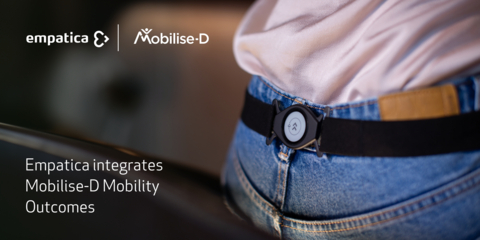BOSTON--(BUSINESS WIRE)--Empatica, a pioneer in digital biomarker development and patient monitoring driven by AI, today announced a partnership with Mobilise-D, an initiative funded by the Innovative Medicines Initiative (IMI) and EFPIA partners, and coordinated by Newcastle University. This collaboration will integrate Mobilise-D’s validated Digital Mobility Outcomes (DMOs) into Empatica’s Health Monitoring Platform, bringing it one step closer to becoming a single, unified destination for implementing digital endpoints in clinical care and research.
“We are proud to be the first non-consortium member to implement the Mobilise-D consortium’s groundbreaking development and validation work,” said Simone Tognetti, Empatica’s CTO and Co-founder. “This means our Platform can now provide 25 new, validated outcomes for COPD, Parkinson’s, Multiple Sclerosis, and Proximal femoral fracture. The demand for high-quality, purpose-specific measures is immense, and Empatica is ready to support the dissemination of the consortium’s innovative work within the industry.”
The project was launched to innovate ways to better assess people’s mobility in daily life using digital measures and wearable sensors, aiding therapeutic development, clinical practice, and precision medicine. With this partnership, all Mobilise-D DMOs can be measured with Empatica’s EmbracePlus wearable and accessed through the Empatica Health Monitoring Platform, consolidating advanced mobility analytics with Empatica’s robust technology.
Lynn Rochester, Professor at Newcastle University and Mobilise-D co-lead, said, “A major barrier to the implementation of digital outcomes in clinical trials is the availability of systems that can deliver accurate and reliable data in a timely and seamless manner. We are delighted that Empatica have chosen to integrate the Mobilise-D advanced mobility analytics, addressing this barrier and moving digital outcome assessment closer to a sustainable solution that drives much-needed innovation and harmonization in clinical trials.”
Providing Mobilise-D’s algorithms alongside Empatica’s service and technology makes it easier for pharma companies to include them in their studies, reducing patient and site burden. Mobilise-D is the first public program to systematically combine device considerations, analytical and clinical validation, and patient and regulatory engagement to generate reliable evidence for digital measures. The critical support from key pharmaceutical companies in the pipeline development leading to the dissemination of these endpoints highlights the collaborative effort required to drive innovation in the industry. Utilizing the algorithms in interventional clinical trial settings is a key step toward the regulatory approval of digital endpoints in clinical drug development.
Visit Empatica’s website to learn more about its full digital measure offering and how the Empatica Health Monitoring Platform can facilitate clinical care and research.
Empatica
Empatica Inc is a pioneer in continuous, unobtrusive remote health monitoring driven by AI. Empatica's FDA-cleared platform and technology are used by thousands of institutional partners for research purposes, in studies examining stress, sleep, epilepsy, migraine, depression, addiction, and other conditions. Its flagship medical wearable, EmbracePlus, has been developed with key partners including HHS, USAMRDC, and the NASA-funded TRISH.
Mobilise-D
Mobilise-D is a consortium funded under the EU Innovative Medicines Initiative and EFPIA partners comprised of experts from 22 academic institutions, 12 industry partners from pharmaceutical, technology, and clinical research organisations, and people with diverse health conditions and mobility impairments. The primary objective of Mobilise-D was to develop a novel method to accurately and reliability assess change in one’s mobility in the real-world environment using digital technologies, including a single body-worn device. The project focused on conditions which affect mobility, including COPD, Parkinson’s disease, multiple sclerosis, hip fracture recovery, and congestive heart failure.




